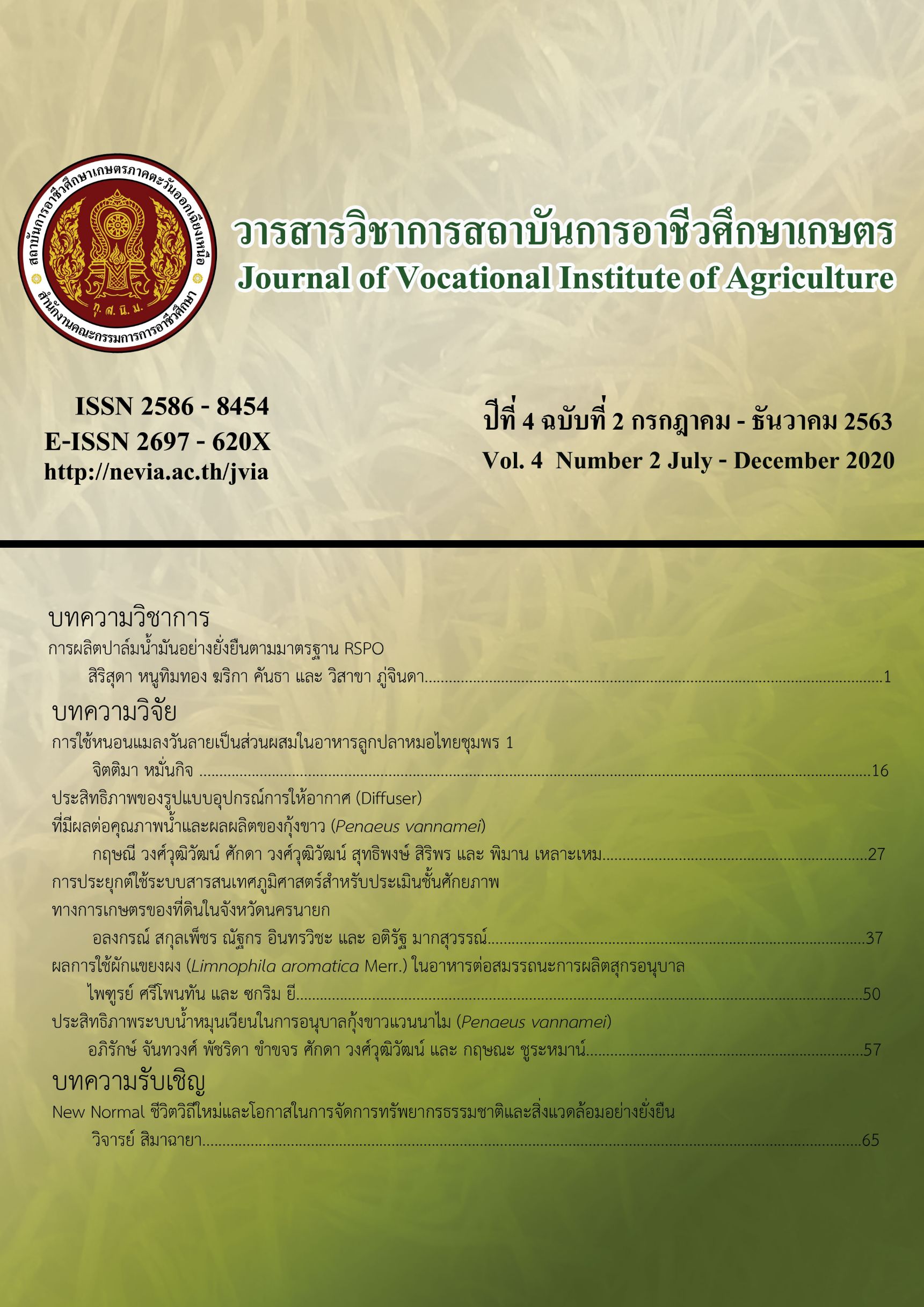Sustainable oil palm production in accordance with RSPO standards
Main Article Content
Abstract
The aim of this article is to study the concept of sustainable palm oil production in accordance with RSPO standards that reviewed relevant literature, reports and academic documents. that reviewed relevant literature, reports, and academic documents. Sustainable Palm Oil Production Standard (RSPO) is a standard supporting sustainable palm oil production which covers economic, social, and environmental aspects, and community responsibility. Sustainable palm oil production in accordance with RSPO standards promotes better understanding of palm plantation management, better production quality and less production costs, more income and better life quality for farmers, less forest encroachment, reduce environmental impact, more business joins, better production process and waste recycling. RSPO standard is likely to be trade barriers. However, the farmers or entrepreneurs, who accredited RSPO standard, can be promoted to manage Palm cultivation as mentioned, and a sustainable palm oil production. It also increases the negotiation power on business as well.
Article Details
The content and information in articles published in the Journal of Vocational Education in Agriculture are the opinions and responsibility of the article's author. The journal editors do not need to agree or share any responsibility.
Articles, information, content, etc. that are published in the Journal of Vocational Education in Agriculture are copyrighted by the Journal of Vocational Education in Agriculture. If any person or organization wishes to publish all or any part of it or to do anything. Only prior written permission from the Journal of Vocational Education in Agriculture is required.
References
ชัยวัช โชวเจริญสุข. (2563). แนวโน้มธุรกิจ/อุตสาหกรรม ปี 2563-2565: อุตสาหกรรมปาล์มน้ำมัน.
กรุงเทพฯ: ธนาคารกรุงศรีอยุธยา.
กระทรวงอุตสาหกรรม. (2562). ประกาศกระทรวงอุตสาหกรรม เรื่อง กำหนดชนิดคุณภาพวัตถุดิบในการ
ผลิตของโรงงานสกัดน้ำมันปาล์ม พ.ศ. 2562.
ธีระพงศ์ จันทรนิยม. (2556). RSPO มาตรฐานการผลิตปาล์มน้ำมันอย่างยั่งยืน. สงขลา: ศูนย์วิจัยและ
พัฒนาการผลิตปาล์มน้ำมัน คณะทรัพยากรธรรมชาติ มหาวิทยาลัยสงขลานครินทร์.
กรมส่งเสริมการค้าระหว่างประเทศ. (2555). การรับรองมาตรฐานการผลิตน้ำมันปาล์มอย่างยั่งยืน RSPO
สำหรับเกษตรกรรายย่อย. เข้าถึงได้จาก https://www.ditp.go.th/contents_attach.
กรมเชื้อเพลิงธรรมชาติ กระทรวงพลังงาน. (2563). ข่าวพลังงานประจำวัน: เกาะติดสถานการณ์ราคาปาล์ม
น้ำมัน. เข้าถึงได้จาก https://dmf.go.th/public/list/data/detail/id/15008/menu/593.
สำนักงานเศรษฐกิจการเกษตรกระทรวงเกษตรและสหกรณ์.(2563). สรุปมติการประชุมคณะกรรมการ
นโยบายปาล์มน้ำมันแห่งชาติ ครั้งที่ 1/2563 (4 มิถุนายน 2563).
กระทรวงเกษตรและสหกรณ์. (2559). ยุทธศาสตร์เกษตรและสหกรณ์ ระยะ 20 ปี (พ.ศ. 2560- 2579).
Thongrak, S. and Kiatpathomchai, S. (2012). Impact Study of the Project on Sustainable
Palm Oil Production for Bio-energy in Thailand. (Final Report). Songkla: Faculty of
Economics, Prince of Songkla University.
สำนักงานมาตรฐานสินค้าเกษตรและอาหารแห่งชาติ. (2562). มาตรฐาน RSPO สู่ประโยชน์การพัฒนา
ปาล์มน้ำมันอย่างยั่งยืน. วารสารเพื่อการเตือนภัยสินค้าเกษตรและอาหาร, 11(2), 7.
สุธัญญา ทองรักษ์ สิริรัตน์ เกียรติปฐมชัย และ ธีระพงศ์ จันทรนิยม. (2559). การพัฒนาเกษตรรายย่อย
แบบมีส่วนร่วมในการผลิตปาล์มน้ำมันอย่างยั่งยืน: กรณีศึกษาสมาชิกกลุ่มวิสาหกิจชุมชนเทพพิทักษ์
ปาล์ม จังหวัดตรัง. วารสารวิจัยเพื่อการพัฒนาเชิงพื้นที่, 10(3), 185-199.
ธีระพงศ์ จันทรนิยม. (2556). RSPO มาตรฐานการผลิตปาล์มน้ำมันอย่างยั่งยืน. สงขลา: ศูนย์วิจัยและ
พัฒนาการผลิตปาล์มน้ำมัน. คณะทรัพยากรธรรมชาติ มหาวิทยาลัยสงขลานครินทร์.
สำนักงานมาตรฐานสินค้าเกษตรและอาหารแห่งชาติ. (2562). มาตรฐาน RSPO มีความสำคัญอย่างไร.
วารสารเพื่อการเตือนภัยสินค้าเกษตรและอาหาร, 11(2), 6.
RSPO. (2020). RSPO. เข้าถึงได้จาก https://www.rspo.org.
ปริญญา จินดาประเสริฐ และคณะ. (2558). ระบบบริหารจัดการปาล์มน้ำมันอย่างมีส่วนร่วมที่ยั่งยืนเพื่อ
เตรียมพร้อมการรับรอง GAP และ RSPO (รายงานการวิจัย). กรุงเทพฯ: สำนักงานพัฒนาการวิจัย
การเกษตร (องค์การมหาชน).
Ruysschaert, D. and Salles, D. (2014) Towards global voluntary standards: questioning
the effectiveness in attaining conservation goals the case of the Roundtable on
Sustainable Palm Oil (RSPO). Ecological Economics, 107(C), 438-446.
Innocenti, E.D. and Oosterveer, P. (2020). Opportunities and bottlenecks for upstream
learning within RSPO certified palm oil value chains: A comparative analysis between
Indonesia and Thailand. Journal of Rural Studies, 78, 426-437.
พวงเพชร อึ้งวิศิษฎ์วงศ์. (2559). พัฒนาอุตสาหกรรมปาล์มน้ำมันไทยสู่มาตรฐาน RSPO. สงขลา:
ธนาคารแห่งประเทศไทย สำนักงานเขตภาคใต้.
Rodthong, W., et al. (2020). Factors Influencing the Intensity of Adoption of the
Roundtable on Sustainable Palm Oil Practices by Smallholder Farmers in Thailand.
Environmental Management, 66, 377–394.

